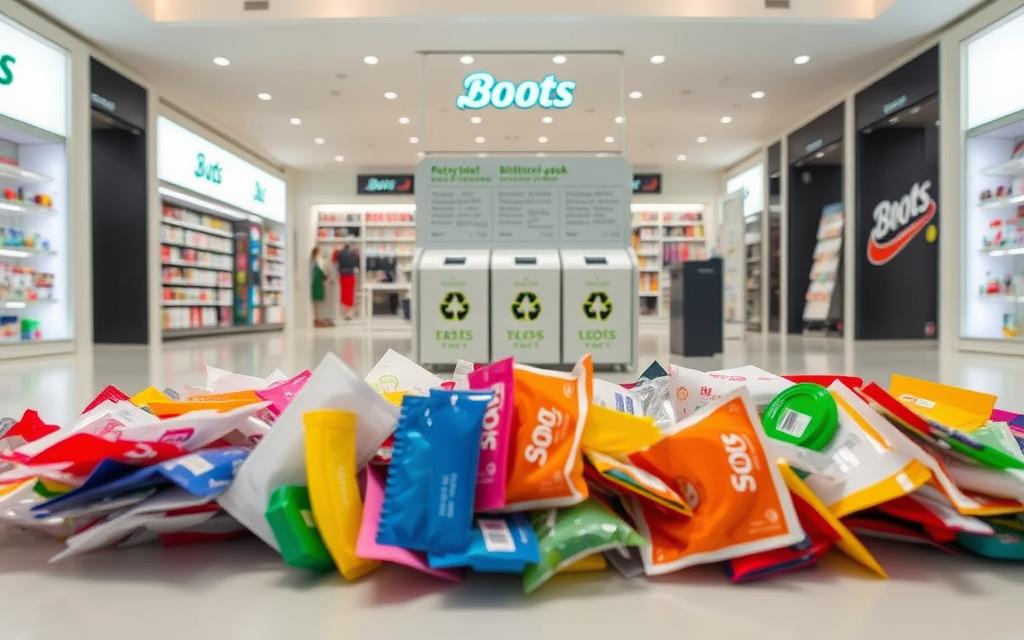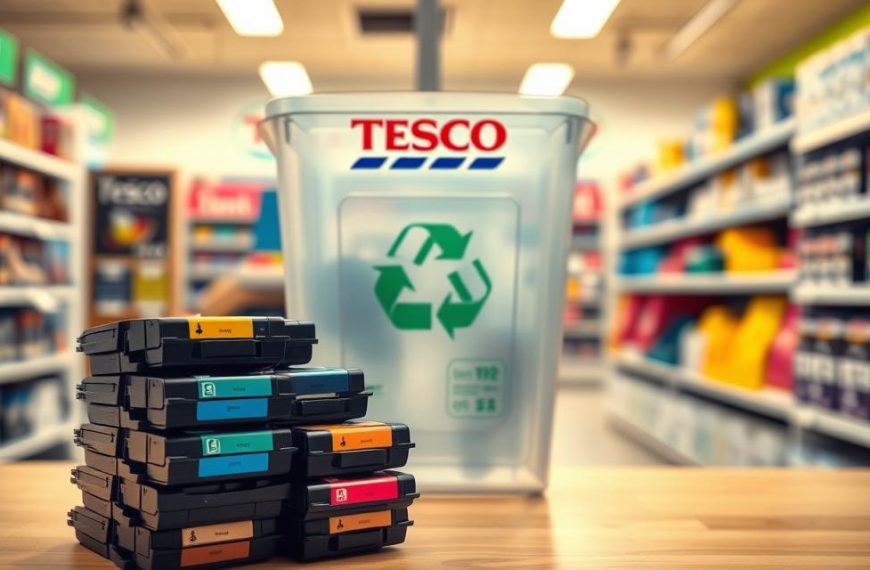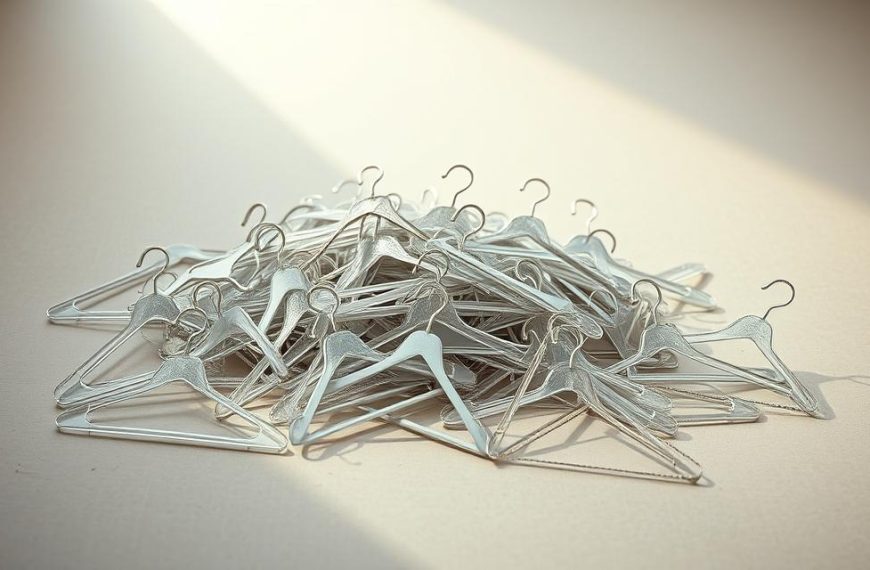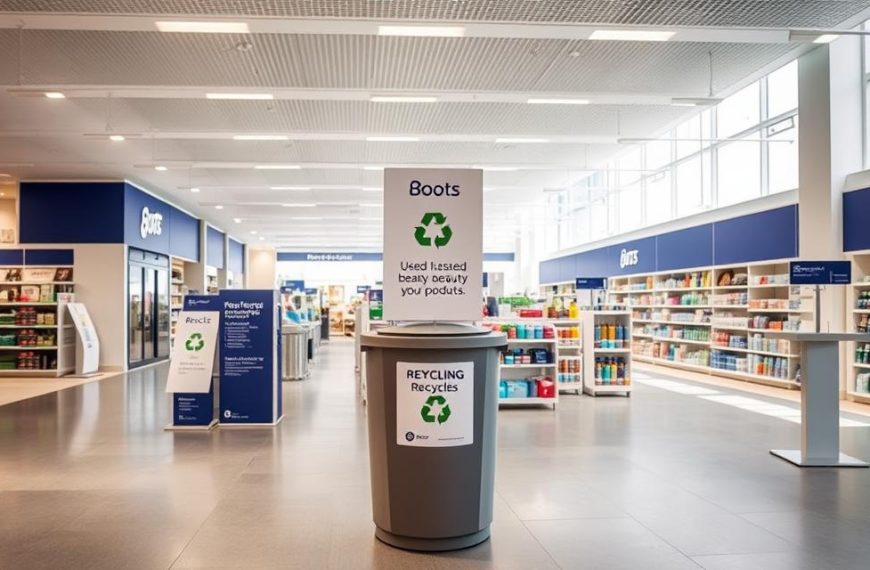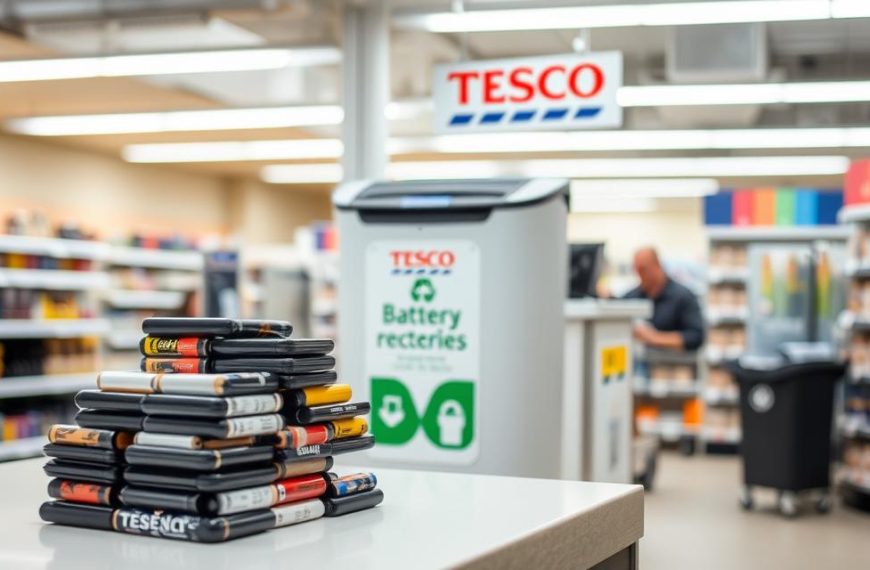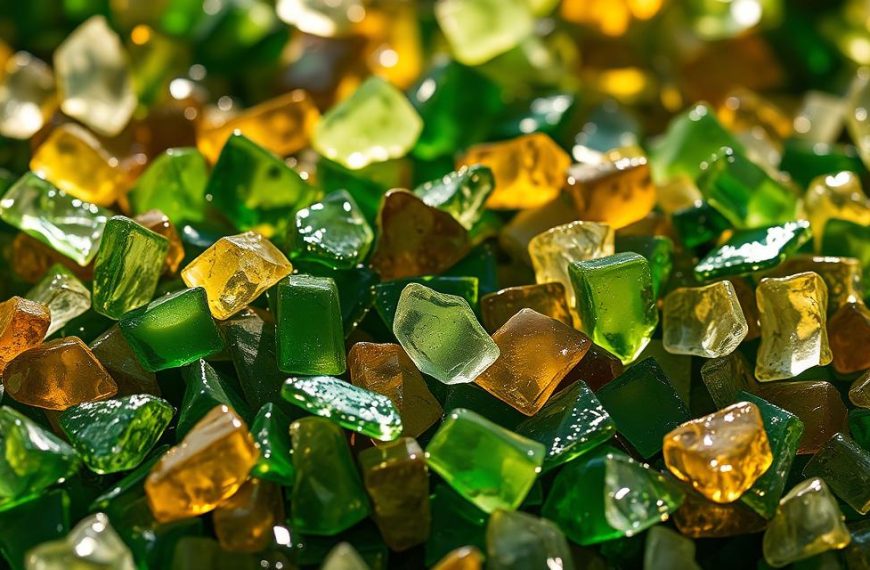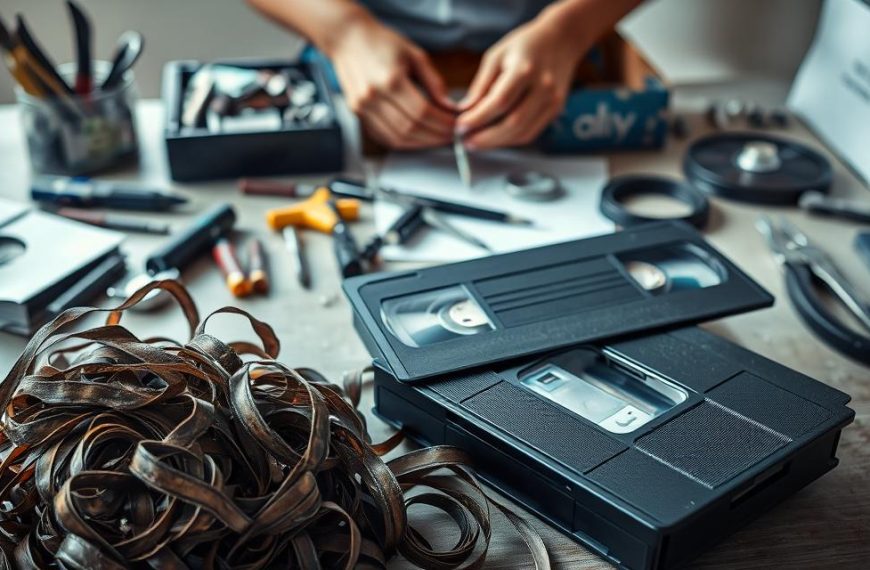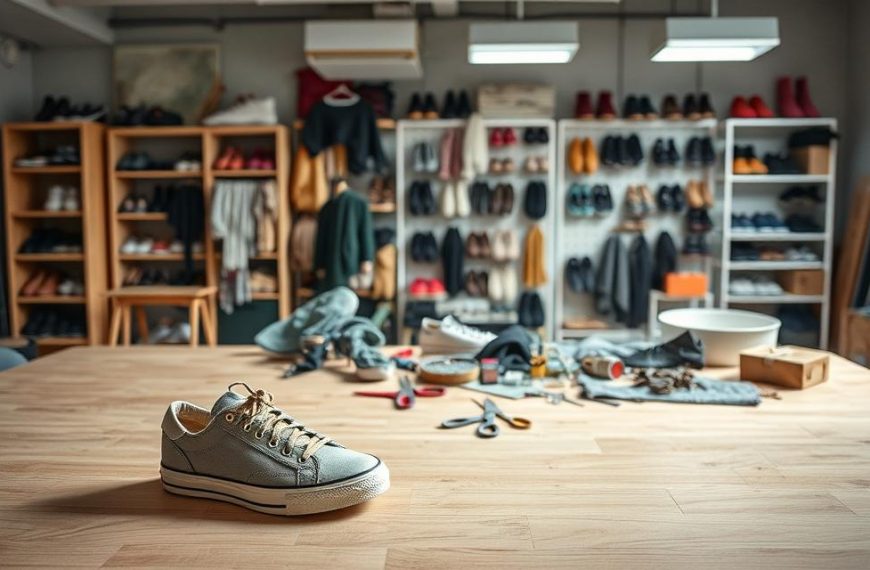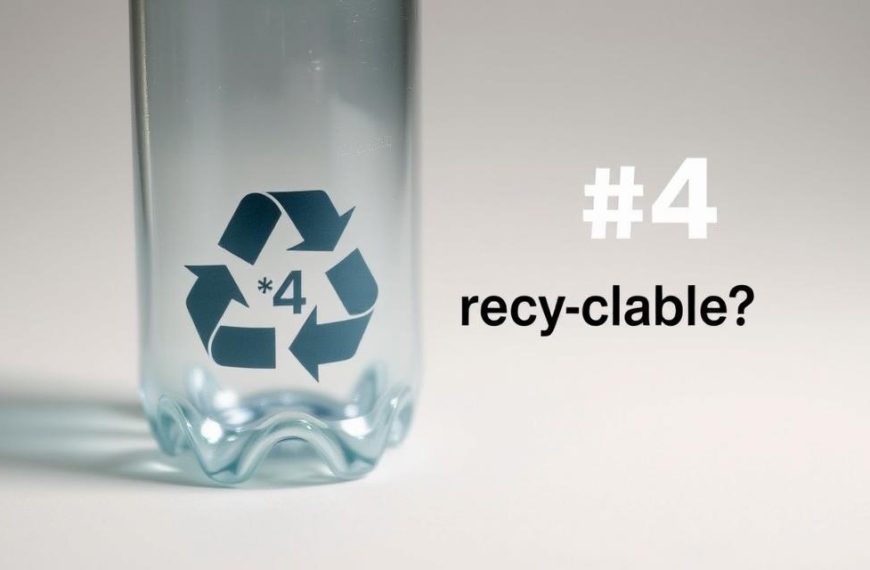Boots has pioneered a groundbreaking initiative to tackle the growing issue of pharmaceutical packaging waste through their nationwide blister pack recycling scheme.
The programme addresses a significant environmental challenge as blister packs, composed of mixed materials, are typically rejected by standard household recycling systems.
With over 800 stores across the UK participating, this comprehensive recycling scheme represents a significant step forward in sustainable healthcare practices, offering consumers a practical way to reduce their environmental footprint.
By combining environmental responsibility with customer rewards through their Advantage Card system, Boots is making a positive impact on health and the environment.
The Environmental Impact of Medication Packaging
The environmental footprint of pharmaceutical packaging, especially blister packs, is a pressing concern that requires immediate attention. The health and beauty sectors are under increasing scrutiny for their environmental impact, with packaging waste being a key area of concern.
Understanding Blister Packs and Their Disposal Challenges
Blister packs, made of plastic and aluminium foil, are widely used for packaging medicines and vitamins. However, their composite construction presents a significant recycling challenge. They cannot be processed through standard household recycling systems, leading to a substantial amount of waste ending up in landfill. As noted by industry experts, “the complexity of blister pack materials makes them difficult to recycle.”
The issue is compounded by the lack of a sustainable disposal route for these packs, creating an environmental blind spot in many recycling programmes. For more information on initiatives addressing this issue, visit Packnode’s sustainability page.
The Scale of Pharmaceutical Waste in the UK
The scale of pharmaceutical waste in the UK is substantial, with millions of blister packs being used annually. The vast majority of these end up in landfill, where they can take hundreds of years to decompose, potentially releasing harmful substances into the environment. The production of these packs requires significant resources and energy, contributing to carbon emissions and exacerbating the environmental impact.
As consumers become more environmentally conscious, the demand for sustainable packaging solutions is growing. Initiatives like Boots’ blister pack recycling programme aim to address this issue by providing a responsible disposal route for used blister packs, thereby reducing waste and promoting a more circular economy.
Introducing Boots’ Blister Pack Recycling Scheme
Boots has taken a significant step towards reducing pharmaceutical waste with the introduction of its Blister Pack Recycling Scheme. This initiative is a response to growing customer concerns about the lack of recycling options for medication packaging.
Origins and Development of the Initiative
The Blister Pack Recycling Scheme originated as a carefully monitored pilot programme in over 100 stores across London and the South East of England. This allowed Boots to test and refine the collection and processing systems in partnership with technology provider Metrisk and recycling specialist MYGroup.
The scheme is an extension of the popular Recycle at Boots initiative, which rewards customers for bringing empty health and beauty products to collection bins at Boots stores. The programme’s development involved significant investment in specialised collection infrastructure and staff training to support customer engagement.
From Regional Pilot to Nationwide Programme
Following an overwhelming positive response, with 170,000 customers participating in the regional trial, Boots rapidly expanded the programme to over 800 stores nationwide. This expansion makes it one of the UK’s largest dedicated pharmaceutical packaging recycling schemes.
The Blister Pack Recycling Scheme integrates seamlessly with Boots’ existing Advantage Card loyalty scheme, providing a familiar framework for customer participation and rewards. Customers can now recycle their blister packs while earning points through their Advantage Card.
How the Blister Pack Recycling Boots Programme Works
The Boots blister pack recycling programme is revolutionising the way we dispose of medication packaging. This innovative programme makes it easier for customers to recycle their blister packs, contributing to a significant reduction in pharmaceutical waste.
Step-by-Step Guide to Recycling Your Blister Packs
To participate in the Boots blister pack recycling programme, customers must follow a simple step-by-step process. First, they need to download the Recycle at Boots App, formerly known as Scan2Recycle, and create an account or log in to their existing one. They then log their empty blister packs through the app, waiting for validation, which typically takes up to 24 hours.
Once the blister packs are validated, customers can bring them to a participating Boots store. At the store, they need to scan the QR code on the dedicated blister pack deposit box to complete the recycling process.
| Step | Description |
|---|---|
| 1 | Download the Recycle at Boots App and create an account or log in. |
| 2 | Log empty blister packs through the app and wait for validation. |
| 3 | Bring validated blister packs to a participating Boots store. |
| 4 | Scan the QR code on the blister pack deposit box. |
Using the Recycle at Boots App
The Recycle at Boots App is the technological backbone of the programme, allowing customers to track their recycling activities and earn rewards. By registering their Boots Advantage Card within the app, customers can earn 100 Advantage Card points (worth £1) when they recycle five empty blister packs in one deposit and make a minimum purchase of £5 in-store.
The app provides a record of the customer’s recycling history, enabling them to see their personal environmental impact and track the rewards they’ve earned. This feature not only encourages customers to continue recycling but also educates them on the importance of proper disposal of pharmaceutical packaging.
Participating Stores and Accessibility
Boots has made significant strides in promoting sustainability through its blister pack recycling programme. The company has strategically implemented the initiative across its retail network, beginning with over 100 stores in London and the Southeast before expanding to more than 800 locations nationwide.
Finding Your Nearest Participating Boots Store
Customers can easily locate their nearest participating Boots store through the company’s online Store Locator tool or directly through the Recycle at Boots App, which provides real-time information on collection points. This ensures that the recycling programme is accessible to a wide customer base.
Expansion Plans for the Recycling Programme
Boots continues to expand the programme with plans to include additional stores across the UK, aiming to make blister pack recycling nationwide and accessible to the majority of their customer base. The expansion strategy focuses on areas with high prescription medication usage and vitamin supplement consumption.
The programme’s success is attributed to the dedicated collection bins in participating stores, making it easy for customers to deposit their blister packs. With a focus on health and beauty, Boots is committed to reducing pharmaceutical waste and promoting sustainability.
Rewards for Recycling: The Advantage Card Connection
Boots’ innovative approach to recycling has led to a unique partnership between their blister pack recycling initiative and the Advantage Card loyalty programme. This collaboration creates a dual incentive system that rewards customers for their environmental responsibility.
Earning Points Through Recycling
Customers who are Boots Advantage Card holders can earn 100 points (worth £1) for every five empty blister packs they recycle at a participating Boots store, provided they spend £5 or more in-store. The reward system is facilitated through the Recycle at Boots App, which tracks customers’ recycling activities and automatically credits points to their Advantage Card account.
The process is straightforward: customers simply deposit their empty blister packs at a participating store, and the app ensures that the corresponding points are awarded to their Advantage Card account.
Maximising Rewards with Combined Recycling Efforts
Boots offers enhanced rewards for customers who participate in multiple recycling streams. For instance, customers can earn 500 Advantage Card points when they recycle five hard-to-recycle health and beauty empties through the Recycle at Boots app and spend £10 in-store. By combining different recycling efforts, customers can maximise their rewards, making the most of their environmental efforts.
The tiered reward structure encourages comprehensive recycling habits, incentivising customers to collect and deposit various types of packaging that would otherwise end up in landfill. This approach not only benefits the environment but also provides customers with a sense of accomplishment and rewards their eco-friendly behaviour.
The Recycling Process: What Happens to Your Blister Packs
The journey of your blister packs doesn’t end at the Boots store; it just begins. As stated by MYGroup, a pioneer in recycling technology, “Innovative recycling solutions are crucial for reducing waste and promoting sustainability.” After being collected from Boots stores, blister packs are sent to MYGroup’s specialised facilities for processing.
The Technology Behind Separating Materials
The recycling process utilises advanced technology to separate the composite materials in blister packs. Custom-designed machinery efficiently divides the plastic components from the aluminium foil backing, allowing each material to be processed through different recycling streams. “The separation process is critical in ensuring that both the plastic and aluminium are recycled effectively,” notes an industry expert.
The aluminium foil recovered is particularly valuable as it can be infinitely recycled without loss of quality, making it ideal for conventional metal recycling channels. This process not only conserves resources but also reduces the environmental impact associated with producing new aluminium.
From Waste to Resource: The Creation of MYBoard™
The plastic components undergo a transformation process where they are cleaned, processed, and converted into a versatile material called MYBoard™. This material serves as an environmentally friendly alternative to traditional building materials and has a wide range of applications, including playground equipment, furniture, and construction materials.
MYBoard™ represents a true circular economy solution, taking what was once considered unrecyclable waste and converting it into durable materials. As a result, the recycling of blister packs through Boots’ initiative significantly contributes to reducing landfill waste and promoting sustainability.
By recycling blister packs, consumers play a crucial role in giving these materials a second life, demonstrating the potential of innovative recycling technology to close the loop on previously problematic waste streams.
Environmental Benefits of Boots’ Recycling Initiative
Boots’ innovative recycling programme is revolutionising the way we think about waste, particularly when it comes to blister packs. By providing a dedicated recycling scheme for these commonly used packaging items, Boots is making a significant contribution to reducing the environmental impact of pharmaceutical waste.
Reducing Landfill Waste and Pollution
The environmental benefits of this initiative are multifaceted. By diverting millions of blister packs from landfill sites across the UK, Boots is helping to mitigate the substantial environmental challenge posed by these composite packaging items. Blister packs can take hundreds of years to break down and may leach chemicals into soil and water systems if not disposed of properly. The programme’s impact is particularly significant considering the daily accumulation of such waste in households nationwide.
As Andrew Lane, Director of Boots, noted, “Our recycling initiative is a crucial step towards a more sustainable future.” By recycling blister packs, Boots is not only reducing landfill waste but also helping to minimize the potential for environmental pollution.
Supporting Circular Economy Principles
Boots’ recycling programme exemplifies circular economy principles by transforming what was previously considered end-of-life waste into valuable new products. The materials recovered from blister packs are used to create products such as construction materials and community furniture, thus reducing the demand for virgin resources, particularly aluminium. This closed-loop system not only reduces waste but also decreases the carbon footprint associated with producing new materials. By supporting the recycling of blister packs, consumers are playing a vital part in promoting sustainable practices and reducing the environmental impact of pharmaceutical packaging.
As the programme continues to grow, it is expected to make an even more significant contribution to the UK’s national sustainability goals by addressing a specific waste stream that has traditionally been overlooked.
Customer Response and Programme Success
The response to Boots’ blister pack recycling programme has been overwhelmingly positive, with a substantial number of customers signing up. This enthusiasm has been a driving factor in the programme’s rapid expansion across the UK.
Key Statistics
The programme’s success is evident in the impressive participation statistics. The initial pilot phase in London and the Southeast attracted 170,000 customers, prompting Boots to expand the programme to over 800 stores nationwide. The Recycle at Boots initiative has processed over 3.1 million items since its launch in 2020, demonstrating significant customer engagement.
- The programme has seen a substantial increase in participation, with a large number of customers taking advantage of the recycling scheme.
- Boots has effectively leveraged customer engagement to strengthen brand loyalty, reinforcing their commitment to environmental responsibility.
Customer Feedback
Customer testimonials have been overwhelmingly positive, with many appreciating the dual benefits of environmental action and Advantage Card rewards. The brand-agnostic nature of the scheme has been particularly well-received, allowing customers to recycle blister packs from any manufacturer.
“I’ve been recycling my blister packs at Boots for a while now, and it’s great to see the company taking steps towards sustainability. The process is easy, and I love earning points on my Advantage Card!”
The convenience of the programme, integrated into regular shopping trips, has made sustainable disposal more accessible. Positive word-of-mouth marketing has further amplified the programme’s success, creating a ripple effect of environmental awareness.
Boots’ Broader Sustainability Commitments
As a leading health and beauty retailer, Boots prioritizes environmental responsibility. The company’s commitment to sustainability encompasses various aspects of its operations, from product sourcing and packaging design to customer engagement initiatives.
The ‘Be More Edit’ and Sustainable Product Choices
Boots is helping customers make more sustainable choices through its ‘Be More Edit’ initiative. This programme categorizes products into plastic-free, recycled, reusable, vegan, and cruelty-free options, making it easier for customers to find sustainable alternatives for their health and beauty needs. By providing clearly identified sustainable products, Boots is empowering customers to make environmentally conscious purchasing decisions.
Plastic Reduction Initiatives and Future Goals
Boots has taken significant steps to reduce plastic waste, including banning plastic-based wet wipes from its stores in 2022. The company continues to expand its range of refillable products and services, allowing customers to reduce packaging waste. Boots’ sustainability strategy includes ambitious targets for reducing carbon emissions and increasing the use of renewable energy in its operations. Future goals include expanding recycling programmes and increasing the percentage of products that meet enhanced environmental criteria.
By integrating customer engagement through the Advantage Card points system, Boots creates financial incentives that align consumer behaviour with environmental objectives. This comprehensive approach to sustainability demonstrates Boots’ commitment to reducing its environmental footprint and promoting sustainable practices across its operations.
Conclusion: The Future of Sustainable Healthcare Packaging
Boots’ commitment to recycling difficult-to-recycle materials like blister packs demonstrates its dedication to creating a more sustainable future for healthcare packaging. The blister pack recycling programme is part of the broader Recycle at Boots initiative, aiming to make it easier for customers to recycle challenging materials while reducing packaging waste across the UK.
The initiative has shown that retailers can take responsibility for materials that are essential to customers’ daily health routines, from prescription medicines to vitamins and supplements. By linking environmental responsibility with their Advantage Card loyalty programme, Boots has created a model that benefits both customers and the environment.
The success of the programme suggests potential for expansion into other hard-to-recycle healthcare items, creating a comprehensive solution for sustainable disposal of medical and wellness products used in the home. As consumer awareness of packaging waste grows, Boots’ approach provides a blueprint for health and beauty retailers to respond proactively to changing expectations around corporate environmental responsibility.
The transformation of blister pack materials into useful products like furniture and construction materials illustrates the practical possibilities of circular economy principles. Boots’ leadership in this area positions them at the forefront of retail sustainability, particularly within the health and beauty sector.
The future of sustainable healthcare packaging will likely involve continued innovation in both materials design and end-of-life solutions, with Boots’ recycling initiative representing an important step in this ongoing evolution.
